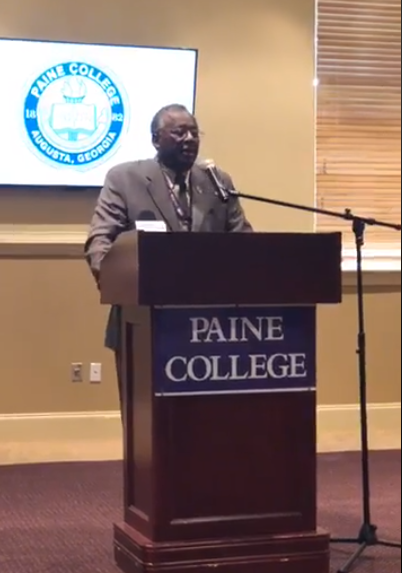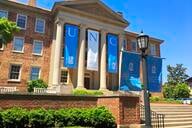You have /5 articles left.
Sign up for a free account or log in.

Paine College president Jerry L. Hardee speaks to reporters Monday.
Facebook Live
The president of a small historically black college in Augusta, Ga., said its officials will seek a new accreditor -- and fight for its survival -- after a federal judge ruled that a regional agency can withdraw its accreditation over financial deficiencies.
Paine College, a private HBCU affiliated with the United Methodist Church and the Christian Methodist Episcopal Church, was on probation with the Southern Association of Colleges and Schools' Commission on Colleges (SACSCOC) pending a final ruling by U.S. District Court Judge Thomas H. Thrash Jr. in a lawsuit surrounding the issue. On Thursday, Thrash denied the college's request for a partial summary judgment and granted the commission's motion for a summary judgment. That means Paine "will be removed as an accredited institution" of SACSCOC, the accreditor said in a statement.
In a statement Monday, Paine president Jerry L. Hardee said lawyers for the college “are carefully reviewing the order and evaluating the next steps in this litigation.” But he said Paine still has a claim pending before the court and that an injunction that restored Paine as a SACSCOC member “is still in effect.” He said Paine “will remain a member of SACSCOC until the court orders otherwise.”
Belle S. Wheelan, the Southern accreditor's president, said that assertion misrepresents the ruling: “The judge dismissed the injunction,” she said. “Unless they appeal, they are no longer accredited.” A document filed by the district court's clerk on Saturday describes the case as "dismissed."
Speaking to reporters Monday afternoon, Hardee began his remarks defiantly, repeating three times, “Paine College is accredited.”
The college, facing tight financial straits, has faced possible loss of accreditation for several years. While it can continue to operate without it, losing accreditation means forfeiting access to federal Title IV funding -- which could be devastating, since nearly all of its students rely on financial aid.
“We always hate to see an institution lose membership with us,” said Wheelan. “I don’t like to see students negatively impacted for any reason, but when they are heavily dependent on Title IV, it makes it more difficult to deal with.”
She said the college will “have to make some financial changes in order to continue to operate.” Reached at a meeting in Washington, Wheelan said she had not recently been in touch with Hardee, so she didn’t know if Thrash's Oct. 11 ruling could force the college to close. She said Paine can reapply for accreditation with her agency or with another accreditor.
In his remarks, Hardee said the college was in talks to do just that with the Transnational Association of Christian Colleges and Schools (TRACS). “They did a campus visit,” he said. “They indicated a couple of recommendations, and they’ve invited us to Dallas, Texas, two weeks from now to meet with their accrediting committee for a recommendation up or down in terms of Paine College’s accreditation.”
But he said that the college had "taken care" of the financial issues that SACSCOC raised, and that the TRACS team “didn’t find anything” that would prevent the college from earning accreditation with them.
Wheelan couldn't comment on the differences between the two organizations' standards, but she said that seeking TRACS accreditation is "a logical option" for Paine.
“We encourage an institution to do what they have to do in the best interests of their students,” she said.
Speaking to reporters, Hardee said he told students early Monday, “The good news is we’re accredited. The better news is we may be, in two weeks, accredited by two accrediting bodies.” Indicating the group of gathered reporters, he added, “The bad news, of course, for you is it’s hard to get a story when there really isn’t a story. The story is, we’re still accredited. Nothing has changed, other than the fact that we have to address the order handed down by Judge Thrash.”
He said the college was still debating whether to drop the case, but that eventually it would seek to regain full accreditation from the regional agency, which carries more prestige, even after it earns TRACS accreditation.
He repeated his assertion that while the court case proceeds, the college retains its SACSCOC accreditation. “We can easily appeal,” he told reporters. “In other words, the case is ongoing and as long as that case is ongoing, Paine College is accredited.”
Helene Carter, assistant vice president of institutional advancement, later clarified that Paine College "is a member of TRACS having secured applicant status" as of Aug. 1. She said it is active for five years.
Enrollment Declines
Loss of accreditation can often be a death sentence to HBCUs -- since 1986, at least six private HBCUs have lost SACSCOC accreditation: Bishop College, Mary Holmes College, Morristown College, St. Paul’s College, Knoxville College and Morris Brown College. With the exception of Knoxville and Morris Brown, the others have closed.
At Paine, accreditation has been an open issue since 2014, when SACSCOC, also based in Georgia, placed it on probation. In June 2016, the college said it would appeal the commission’s finding that it had not satisfied deficiencies in three areas: financial resources and stability, financial stability, and control of sponsored research/external funds.
At the time, Paine enrolled 534 students, with more than 95 percent receiving financial aid. Enrollment has slipped below 500 since then, Hardee said Monday.
The association had raised questions about the college's finances as early as 2011, after The Augusta Chronicle reported on a whistle-blower’s findings that Paine hadn’t returned unused financial aid for students who withdrew, and that it had bounced financial aid checks, among other issues.
In 2014, the college reported a $2.9 million loss and said it had drawn $5.4 million from a line of credit. In 2015, Paine suspended its football program as it sought to shore up its financials. Later that year, it was unable to make payroll for employees.
Hardee became president in April 2017, and last January he announced that he planned to raise millions to get the college back into compliance. He also said the college would build three new dorms and launch a night school, among other plans.
He said the college had recently brought in $1.5 million in federal Title III grants that hadn't been previously accessed, The Augusta Chronicle reported. “We just needed someone to make the decision, to pull the trigger to get it done,” he said.
Hardee also said he planned to double enrollment between the fall of 2018 and 2019 -- and that the college was beginning to reconnect with donors who had given up on it because of financial instability.
“There are so many people that love Paine College that had shut down in terms of their communication with the college, in terms of their giving to the college,” he said. “So we’re getting those people back. It’s going to take a little time, but we are going to get it done.”
Paine, which calls itself a “church-related liberal arts institution,” was founded in 1882 to provide an education that emphasizes “academic excellence, ethical and spiritual values, social responsibility, and personal development to prepare spiritually-centered men and women for positions of leadership and service.”
On Monday, Hardee said HBCUs are key to the survival of the U.S.'s African American community. “Instead of getting rid of them we ought to have 100 more,” he said.




